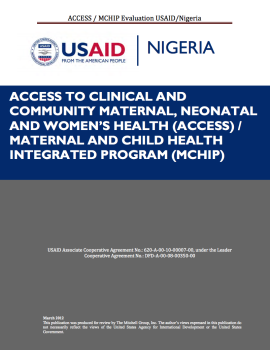Access to Clinical and Community Maternal, Neonatal and Women’s Health (ACCESS) / Maternal and Child Health Integrated Program (MCHIP)
The United States Agency for International Development (USAID)/Nigeria transferred field support funding annually, over the period January 2006 through February 2012, to two consecutive USAID/Washington centrally-funded projects, first, to the Access to Clinical and Community Maternal, Neonatal and Women’s Health Project (ACCESS) and subsequently, when ACCESS ended, to the Maternal and Child Health Integrated Program (MCHIP). The purpose of this final external evaluation is to assess achievements under the ACCESS/MCHIP Project relative to their objectives and indicators. Specifically, the evaluation will assess:
- ACCESS/MCHIP’s performance achievements against project indicators encompassing issues of population coverage, couple years of protection (CYPs), contraceptive prevalence, impact on mortality and effectiveness of key innovations implemented;
- ACCESS/MCHIP’s performance of in-service facilities and communities on improving the quality of care in Emergency Obstetric and Newborn Care (EmONC), antenatal and postnatal care, Family Planning (FP) and safe maternity services for normal births; and
- Sustainability of achievements under the ACCESS/MCHIP Project at the national, state and local areas and service delivery sites, including the impact on policy at the federal and state levels.
Several constraints were experienced during the conduct of this evaluation due to the deteriorating security situation in the Northern states. As a result of travel restrictions and delays encountered in getting to the field, only eight facilities in two states were visited over a five-day period instead of the originally planned 14-16 facilities in all three states over 10 days. However, the team was able to bring State Ministry of Health (SMOH) and Local Government Area (LGA) officials from all three states to Abuja for in-depth interviews, and this provided rich supplemental data to the facility and community feedback obtained during the field visits to the two states. Thus, the evaluation team feels that more than sufficient and complementary data were collected to ensure an informed and valid final evaluation of the ACCESS/MCHIP Project.


